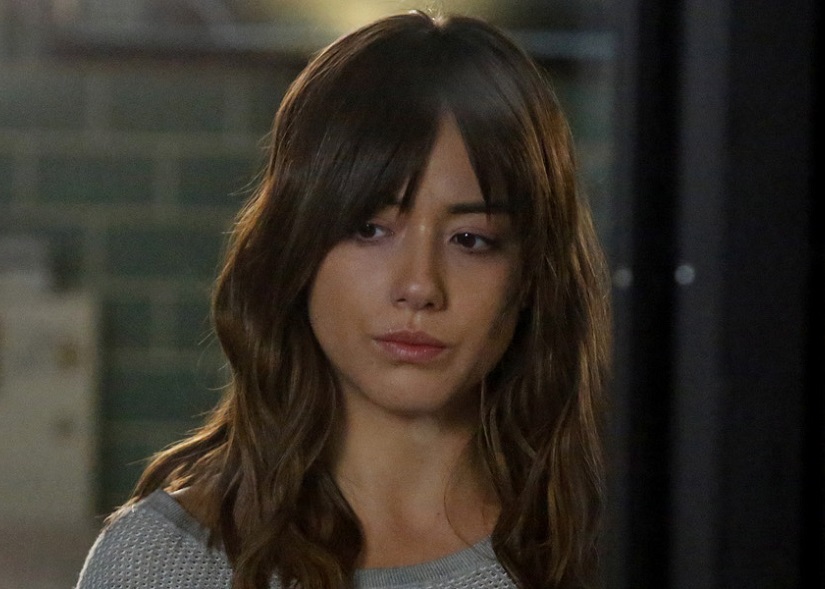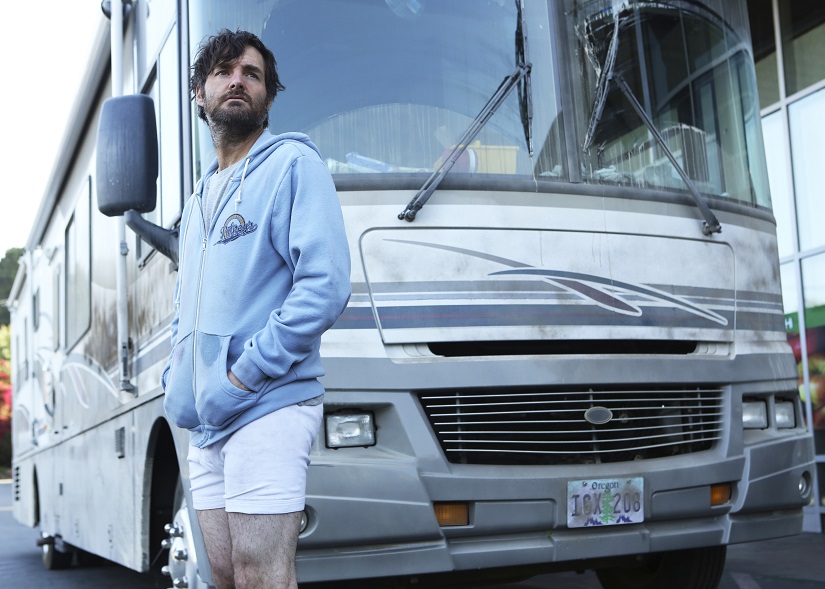This Week in TV is a weekly feature reviewing the best, worst and most interesting episodes of television from the past seven days. The plan is to cover a wide variety of shows, but not always the same ones each week, so let us know in the comments which ones you’d particularly like to read about. This week sees the debut of Tina Fey’s new comedy, Unbreakable Kimmy Schmidt; the return of Marvel’s Agents Of S.H.I.E.L.D.; and Will Forte roaming a deserted Los Angeles as The Last Man Alive.
Unbreakable Kimmy Schmidt – First season
Having been abandoned by NBC, the complete first season of Unbreakable Kimmy Schmidt premiered on Netflix yesterday, hence this review taking a wider look than just the first episode. Kimmy Schmidt is the story of a young woman rescued from an apocalypse cult which saw her locked along with three friends in an underground bunker for fifteen years, before being rescued and let loose to try and make a life for herself in modern day New York. Those who count themselves among 30 Rock‘s devotees will immediately find themselves in familiar territory here, from Jeff Richardson’s strikingly similar score to a humour style leaning heavily on cutaway visual gags and rapidfire wordplay.
In Ellie Kemper, the show finds a perfect lead for a character who, in lesser hands, could come off as irritatingly dumb and over-affected in her cutesiness. Instead, Kemper finds a perfect middle ground that layers the manic chirpiness and enthusiasm with an underlying sense of damage and emotional depth, making Kimmy a fully rounded character behind the quirks. Titus Burgess puts similar pain behind his character, also named Titus, turning a potentially tiresome gay stereotype into a delightfully delicate and ridiculous foil for his new roommate. Jane Krakowski once again plays Jenna Marone, albeit under the new name of Jacqueline Vorhees and with an admirably ludicrous backstory and a grouchy daughter, Xanthippe, who inspires some memorably spiky comebacks from Kimmy.
Despite its immediately winning cast, Kimmy Schmidt struggles to achieve more than a handful of isolated laughs per episode because it never really grounds its comedy in anything real or specific in the way 30 Rock did with television production. The eponymous Kimmy should work as an oddball in a tough, modern city, but instead she’s just one among many exaggerated cartoons. Attempts at social commentary feel clumsy at best and like cynical box-ticking at worst: ideas about victimhood in the pilot (and a more subversive spin on the same topic in episode 5) would provide potent and topical subtext, except the writers insist on punching you in the face with it: “Thank you, victims!” an assistant shouts as he bundles the four women out the back door of a television studio.
Similarly, a gag about Kimmy being subjected to a crass catcall from a builder makes its point perfectly well with a neat and funny punchline (“I wish I were your yellow hat!”), only to have the wit and pleasure sucked out of it by the builder suffering a crisis of conscience and reaching the lazy and reductive conclusion that he only harrasses women because he’s secretly gay. It’s also a little hypocritical for a show puporting to oppose inequalities to base one episode around women coming off worse in divorce settlements, which, no matter how many mitigating circumstances are shoehorned in, still comes off as unironically placing those who benefit from an unequal system in the role of victims of that same system.
As you’d expect from a Tina Fey comedy, Kimmy Schmidt does pull off some terrific gags from time to time – Titus discovering he gets more respect dressed as a werewolf lands an absolutely hysterical conclusion – and is not short of imminently quotable one-liners (#hashbrown), but the humour leans too heavily either on ground already well trodden by 30 Rock – the redneck humour wasn’t funny then, still isn’t now – or on Kimmy’s fish-out-of-water ignorance, which even when delivered by an actress as effortlessly charming as Kemper, can feel exhausted after a while. The show takes a few episodes to get going, peaks in the middle before dropping severely in quality for its final three. As is the Netflix way, it’s light and dumb enough to binge through in a few sittings, but needs to find some substance and specificity in its second season if it’s to match the greatness of its illustrious forebear.
Agents Of S.H.I.E.L.D. – “Aftershocks”
Despite being critically panned for much of its first season, Agents Of SHIELD – and no, I’m not going to keep typing those bloody full stops – was on fantastic form before going into a post-Christmas break, during which it was replaced by the very watchable Agent Carter. It was starting to put together some strong action sequences and a compelling central mystery linking it to a vital but hitherto unexplored area of the Marvel screen universe. True, its characters largely remained as generic and personality-deficient as ever, but Adrianne Palicki proved a strong and charismatic addition to an expanding cast and at least they were doing interesting things, even without being particularly interesting themselves.
‘Aftershocks’ suffers from coming off such a prolonged break, and the clue to its problems is in the title. Despite a pre-episode recap, the events of Skye and Raina’s incursion and transformation in the subterranean Kree city feels too long ago for the relatively slow and pensive aftermath to be as compelling now as it would’ve been three months ago. Skye spends almost the entire episode locked in quarantine, having one-on-one conversations with her teammates through a glass wall, while Raina struggles to come to terms with having become what she sees as a monster. There’s plenty of dramatic meat to chew on, but it’s too late after the event and too downbeat to function as an inviting re-introduction to the series. The absence of a strong central character or single dominant personality is keenly felt because the show’s strongest elements, its action and plotting, are mostly kept on the down-low whilst Coulson and his team mourn a fallen comerade and bounce the blame around.
Raina’s story is more interesting than Skye’s, in no small part because we can immediately see the effect that the Terrigenesis has wrought on her. Her body is covered with thorns and her facial features have mostly melted away, leaving a character previously defined by her beauty and control in a position where she’s stripped of both those assets. Dichen Lachman makes a welcome reappearance, if anyone remembers her popping up momentarily in the pre-Christmas episodes, that is, setting the stage for the blind, teleporting Inhuman who rescues Raina from capture following a suicide attempt. Introducing the Inhumans through Agents Of SHIELD is a canny move which makes the series’ events feel immediately essential to the Marvel screen universe in a way the first season failed to, but despite promising great things to come, ‘Aftershocks’ on its own terms was too busy reminding us of events past than making interesting moves in the here and now.
The Last Man On Earth – “Alive In Tucson”/”The Elephant In The Room”
‘Alive In Tucson’ is one of the boldest, most ambitious and bleakly funny episodes of television to air this season. It focuses entirely on one man, Will Forte’s slobbish Frank Miller, as he attempts to stave off boredom and then depression as seemingly the only survivor of an unspecificed virus which tore through the human race at apparently brutal speed. Though it may come up later, the writers make no effort to explain why the streets aren’t littered with corpses or whether animal and insect life was similarly afflicted: judging by the complete absence of insect swarms when Phil starts using a pool as a toilet, it seems probable.
In any case, it’s clear enough that removing such obstacles allows the show to focus entirely on the character drama without getting unnecessarily unpleasant, which is a perfectly acceptable trade-off. The lack of details works in its favour, allowing the audience to fill in the gaps with their own explanations rather than having to ignore any logical gaps that might exist in an official one provided by the writers. Plus, Phil doesn’t really seem the sort to bother too much with the ‘why’ or ‘how’, so it makes sense that he’d be more preoccupied with his own present interests rather than seeking out answers. The gradual degredation of his mental state gives the character real sympathy even when played strongly for laughs. He may be materialistic and slovenly, but also demonstrates admirable creativity in how he amuses himself – explosive car bowling! – and puts real effort put into seeking out any other trace of human connection he can, even if it initially involves conceding a point to the writers of Cast Away about the friendship appeal of volleyballs.
It’s hard to imagine how the show could’ve sustained itself with a single character for an entire season, but it’s nevertheless disappointing when another survivor, played by Kristen Schaal, shows up at the end of the very first episode. It’s made worse by the fact Schaal’s character, Carol, is the worst kind of stereotypical female nag and buzzkill. There’s real potential in the idea of the last two humans alive having to team up despite hating each other – see Lister and Rimmer on Red Dwarf for further details – but the imbalance is far too severe between Phil’s likeability, in spite of his many flaws, and Carol being yet another loathsome termagant with little to no redeeming qualities. Her attempts to bring him back within the parameters of civilised living may be beneficial in the long run, but her non-stop nagging (and marriage obsession) lands her right in Katherine Heigl territory and completely tanks the second episode. Hopefully the characters will be broken out of that Judd Apatow mould (slobbishly charming man worn down by a scolding woman) as soon as possible, because “The Elephant in the Room” almost immediately squanders the goodwill built up by the outstanding ‘Alive In Tucson’ for the series going forward.


